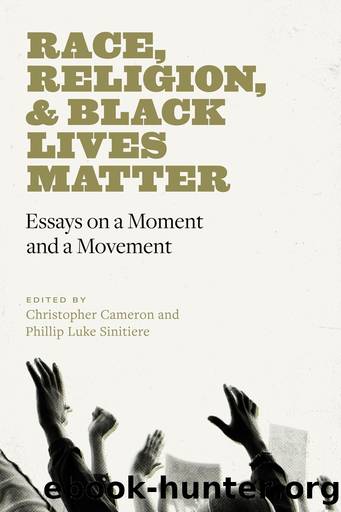Race, Religion, and Black Lives Matter by Christopher Cameron Phillip Luke Sinitiere

Author:Christopher Cameron, Phillip Luke Sinitiere [Christopher Cameron, Phillip Luke Sinitiere]
Language: eng
Format: epub
Tags: Nonfiction, Religion & Spirituality, Reference, History, Social & Cultural Studies, Social Science, Cultural Studies, African-American Studies, Military
ISBN: 9780826502094
Publisher: Vanderbilt University Press
Published: 2021-08-15T04:00:00+00:00
CHAPTER 7
âA Song That Speaks the Language of the Timesâ
Muslim and Christian Homiletic Responses to the Black Lives Matter Movement and the Need for a Spiritual Vocabulary of Admonition
Marjorie Corbman
In a radio interview in February 2016, Patrisse Cullors, one of the founders of the Black Lives Matter movement, elaborated on her vision of the âspiritualâ core of the movement. Standing on the side of Black lives, Cullors averred, is âspiritual work,â a âhealing work.â This transformative commitment, she went on, makes it possible to imagine Black life: âOur imagination has only allowed for us to understand black people as a dying people. We have to change that. Thatâs our collective imagination. Someone imagined handcuffs; someone imagined guns; someone imagined a jail cell. Well, how do we imagine something different that actually centers black people, that sees them in the future? Letâs imagine something different.â As such, the movement represents more than a campaign for changes in policy. In its objective, in Cullorsâs description, of ârehumanizingâ the dehumanized collective imagination, Black Lives Matter is grounded in the âdeeply spiritualâ work of âhealing justice.â At the same time, Cullors referred to the complicated relationship between mainstream Black institutional churches and contemporary activists in the Black Lives Matter movement, many of whom, as women or as LGBTQ+ individuals, have âbeen pushed out of the church.â1 Cullorsâs statements here are consistent with Almeda Wrightâs analysis of the continuity of the Black Lives Matter movementâs ambivalent relationship to religious institutions with historical Black social activism, despite popular conceptions of the civil rights period. Wright demonstrates both that the Black activist movements of the 1960s had a more complicated and at times antagonistic relationship with religious institutions than is commonly narrated and that Black youth activists today are actively engaged in drawing connections between faith and activism even despite these difficulties.2
Cullorsâs interpretation of the work of ârehumanizingâ the dehumanized imagination as a Black spiritual praxis that can occur in concert with or independent from traditional mainstream Black religious institutions shares much in common with religious scholar Anthony B. Pinnâs description of African American religion as a âquest for complex subjectivityâ not primarily defined by the centuries-long history of white American objectification of Black humanity.3 Pinn defines this longing for âcomplex subjectivityâ as the desire to break free from the âfixed forms of identityâ derived from American racial hierarchies in order to cultivate a sense of multidimensional personal and communal identity liberated at heart from the ever-present âghosts of dehumanizationâ haunting Black consciousness.4 Pinn argues that by framing study of Black religious institutions, beliefs, and practices in this way, scholars can avoid reducing Black religious identity to its historically dominant âinstitutional and doctrinal manifestations,â highlighting to the contrary the rich and variegated creativity of Black communities in America in envisioning a broader âlife meaningâ for Black people than that assigned to them by American racial violence and domination.5
Pinnâs framework for interpreting Black religion, like Cullorsâs in the 2016 interview, and this volume on the whole, offers an
Download
This site does not store any files on its server. We only index and link to content provided by other sites. Please contact the content providers to delete copyright contents if any and email us, we'll remove relevant links or contents immediately.
| Baha'i | Cults |
| Demonology & Satanism | Eckankar |
| Egyptian Book of the Dead | Freemasonry |
| Messianic Judaism | Mysticism |
| Scientology | Theism |
| Tribal & Ethnic | Unitarian Universalism |
The Four Agreements by Don Miguel Ruiz(5534)
Breaking Free by Rachel Jeffs(3631)
The Hatha Yoga Pradipika (Translated) by Svatmarama(2501)
120 Days of Sodom by Marquis de Sade(2447)
Member of the Family by Dianne Lake(2037)
The Tao of Physics by Fritjof Capra(1861)
The Psychedelic Gospels: The Secret History of Hallucinogens in Christianity by Jerry B. Brown(1830)
The Road to Jonestown by Jeff Guinn(1746)
Uriel's Machine by Christopher Knight(1627)
Going Clear by Lawrence Wright(1578)
Going Clear: Scientology, Hollywood, and the Prison of Belief by Lawrence Wright(1576)
The Grand Grimoire: The Red Dragon by Author Unknown(1420)
The Gnostic Gospel of St. Thomas by Tau Malachi(1415)
Key to the Sacred Pattern: The Untold Story of Rennes-le-Chateau by Henry Lincoln(1353)
The Malloreon: Book 02 - King of the Murgos by David Eddings(1311)
Waco by David Thibodeau & Leon Whiteson & Aviva Layton(1298)
The New World Order Book by Nick Redfern(1260)
The Secret of the Temple by John Michael Greer(1223)
The Initiatory Path in Fairy Tales by Bernard Roger(1180)
